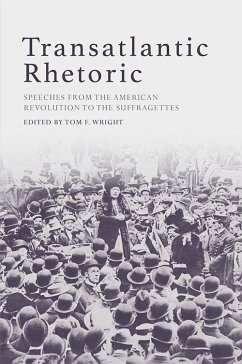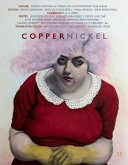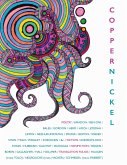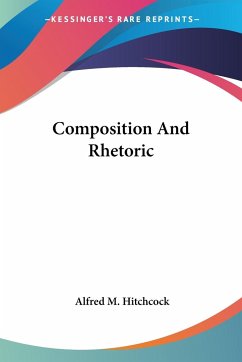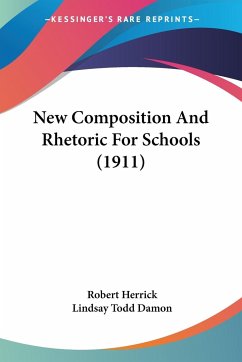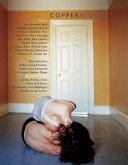Transatlantic Rhetoric
Speeches from the American Revolution to the Suffragettes
Herausgeber: Wright, Tom
Transatlantic Rhetoric
Speeches from the American Revolution to the Suffragettes
Herausgeber: Wright, Tom
- Broschiertes Buch
- Merkliste
- Auf die Merkliste
- Bewerten Bewerten
- Teilen
- Produkt teilen
- Produkterinnerung
- Produkterinnerung
Reclaims public speaking as a central cultural form of the nineteenth century This pioneering collection brings alive the world of public speaking between the American Revolution and the age of the Suffragettes. It presents over seventy speeches by a diverse range of female and male activists, politicians, tribal leaders, fugitive slaves and preachers from both sides of the Atlantic, debating the crucial issues of the day, from socialism and imperialism to slavery and women's suffrage. Complete with detailed notes, introductions, illustrations and suggestions for further reading, it provides a…mehr
Andere Kunden interessierten sich auch für
![Copper Nickel Copper Nickel]() Copper Nickel10,99 €
Copper Nickel10,99 €![Rhetoric And Higher English (1897) Rhetoric And Higher English (1897)]() Goodloe Harper BellRhetoric And Higher English (1897)27,99 €
Goodloe Harper BellRhetoric And Higher English (1897)27,99 €![Copper Nickel (26) Copper Nickel (26)]() Copper Nickel (26)10,99 €
Copper Nickel (26)10,99 €![Composition And Rhetoric Composition And Rhetoric]() Alfred M. HitchcockComposition And Rhetoric29,99 €
Alfred M. HitchcockComposition And Rhetoric29,99 €![New Composition And Rhetoric For Schools (1911) New Composition And Rhetoric For Schools (1911)]() Robert HerrickNew Composition And Rhetoric For Schools (1911)32,99 €
Robert HerrickNew Composition And Rhetoric For Schools (1911)32,99 €![Copper Nickel Copper Nickel]() Copper Nickel10,99 €
Copper Nickel10,99 €![Copper Nickel Copper Nickel]() Copper Nickel10,99 €
Copper Nickel10,99 €-
-
-
Reclaims public speaking as a central cultural form of the nineteenth century This pioneering collection brings alive the world of public speaking between the American Revolution and the age of the Suffragettes. It presents over seventy speeches by a diverse range of female and male activists, politicians, tribal leaders, fugitive slaves and preachers from both sides of the Atlantic, debating the crucial issues of the day, from socialism and imperialism to slavery and women's suffrage. Complete with detailed notes, introductions, illustrations and suggestions for further reading, it provides a unique introduction to transatlantic history and culture. Key Features: - Places famous speeches by Emmeline Pankhurst, Abraham Lincoln, Mark Twain and Oscar Wilde alongside previously unpublished texts. - Offers a more racially, ethnically and politically varied range of speeches than ever collected before. - Includes illustrations and suggestions for further readings. - A 'how to use this book' section provides historical contextualisations and valuable guidance for steering classroom discussions. Tom F. Wright teaches English and American Studies at the University of Sussex.
Hinweis: Dieser Artikel kann nur an eine deutsche Lieferadresse ausgeliefert werden.
Hinweis: Dieser Artikel kann nur an eine deutsche Lieferadresse ausgeliefert werden.
Produktdetails
- Produktdetails
- Verlag: Edinburgh University Press
- Seitenzahl: 312
- Erscheinungstermin: 18. Februar 2020
- Englisch
- Abmessung: 241mm x 168mm x 15mm
- Gewicht: 635g
- ISBN-13: 9781474426268
- ISBN-10: 1474426263
- Artikelnr.: 53302824
- Herstellerkennzeichnung
- Produktsicherheitsverantwortliche/r
- Europaallee 1
- 36244 Bad Hersfeld
- gpsr@libri.de
- Verlag: Edinburgh University Press
- Seitenzahl: 312
- Erscheinungstermin: 18. Februar 2020
- Englisch
- Abmessung: 241mm x 168mm x 15mm
- Gewicht: 635g
- ISBN-13: 9781474426268
- ISBN-10: 1474426263
- Artikelnr.: 53302824
- Herstellerkennzeichnung
- Produktsicherheitsverantwortliche/r
- Europaallee 1
- 36244 Bad Hersfeld
- gpsr@libri.de
Tom Wright is Lecturer in English Literature at the School of English, University of Sussex. He is the author of Lecturing the Atlantic: Speech, Print and an Anglo-American Commons (Oxford, 2017) and editor of The Cosmopolitan Lyceum: Lecture Culture and the Globe in Nineteenth Century America (UMass, 2013) and has published widely about nineteenth century cultural history and literature.
Introduction Illustrations 1 Nationalism and Independence Part A: Debating American Freedom 1. Joseph Galloway
A Plan to Avoid War (Philadelphia
1774) 2. Edmund Burke
'On Conciliation with the Colonies' (London
1775) 3. Patrick Henry
'Give Me Liberty or Give Me Death' (Richmond
Virginia
1775) 4. Buckongahelas
'You See a Great and Powerful Nation Divided' (Delaware
1781) Part B: Declaring Independence 5. Thomas Jefferson et al.
'The Unanimous Declaration of the United States of America' (Philadelphia
1776) 6. Jean-Jacques Dessalines
'Haitian Declaration of Independence' (Gonaïves
Saint-Domingue
1804) 7. Robert Emmett
'Speech From the Dock' (Dublin
1803) 8. Miguel Hidalgo y Costilla
'The Cry of Dolores' (Dolores
Mexico
1810) Part C: Pan-Nationalism and Trans-nationalisms 9. Tecumseh
'Sleep No Longer
O Choctaws and Chickasaws' (1811) 10. Jose Martí
'Our America' (New York
1889) 11. W. E. B. Dubois
'To the Nations of the World' (London
1900) 2 Gender
Suffrage and Sexuality Part A: Gender Equality 1. Elizabeth Cady Stanton
Keynote address at Seneca Falls convention (Seneca Falls
1848) 2. Sojourner Truth
'Speech to the Women's Rights Convention' (Akron
Ohio
1851) 3. Sojourner Truth
'Address to the Equal Rights Association' (New York City
1867) 4. Josephine Butler
Speech on Sex Workers' Rights (Wigan
1870) Part B: Suffrage for Women 5. Sir Henry James and W. E. Forster
'The Anti-Suffrage Case' (London
1871) 6. Susan B. Anthony
'Is it a Crime for a US Citizen to Vote' (Rochester
NY
1872) 7. Emmeline Pankhurst
'Freedom or Death' (Hartford
1913) Part C: Sexuality and Reproduction 8. Frances Ellen Watkins Harper
'Enlightened Motherhood' (Brooklyn
1892) 9. Oscar Wilde
Testimony at Indecency Trial (London
1895) 10. Anna Ruling
'The Women's Movement and the Homosexual Problem' (Berlin
1904) 11. Theodore Roosevelt
'On American Motherhood' (Washington DC
1905) 3 Slavery and Race Part A: Debating Slavery 1. James Penny
Testimony in Defence of a Humane Slave Trade (London
1788) 2. William Wilberforce
'Resolutions Respecting the Slave Trade' (London
1789) 3. Absalom Jones
Thanksgiving Sermon (Philadelphia
1808) 4. John Calhoun
'Slavery
A Positive Good' (Washington DC
1837) 5. Angelina Grimke
'Speech at Pennsylvania Hall' (Philadelphia
1838) 6. Frederick Douglass
'What to the Slave is July 4th?' (Rochester
New York
1852) 7. Henry Ward Beecher
'Peace
Be Still' Sermon (Brooklyn
1861) Part B: Race and Civil Rights 8. David Walker
'The Necessity of a General Union Among Us' (Boston 1828) 9. Robert Knox
'Lecture on The Races of Man' (Manchester
1848) 10. Alexander Crummell
'The American Mind and Black intellect' (Washington DC
1898) 11. Ida B. Wells
'Lynch Law in All Its Phases' (Boston
1893) 4 Faith
Culture and Society Part A: The Role of Faith 1. Larena Lee
'My Call to Preach the Gospel' (Marlyand
c.1810s) 2. Charles Spurgeon
'Compel Them to Come In' (London
1858) 3. Robert Ingersoll
'The Gods' (Fairbury
Illinois
1873) 4. Swami Vivekanandana
'Address at the World Parliament of Religions' (Chicago
1893) Part B: Culture and Morality 5. Ralph Waldo Emerson
'Ethics' (Boston
1837) 6. John Ruskin
'Traffic' (Bradford
1864) 7. Oscar Wilde
'Art of The English Renaissance' (New York
1882) 8. William Morris
'Art and Socialism' (Leicester
1884) Part C: Society and Hierarchy 9. Henry 'Orator' Hunt
'Speech Spa Fields' (London
1816) 10. Benjamin Disraeli
In Defence of the Feudal System (Shrewsbury
1842) 11. Peter H. Clark
'Socialism: The Remedy for the Evils of Society' (Cincinnati
1877) 12. Lucy Parsons
'I am an Anarchist' (Kansas City
1886) 13. William Jennings Bryan
'The Cross of Gold Speech' (Chicago
1896) 5 Empire and Manifest Destiny Part A: Opposing Empire 1. Nan'yehi et al.
'Cherokee Women Address Their Nation' (Georgia
1817) 2. Francisco Mejia
Proclamation Against American Usurpation (Matamoros
1846) 3. John Calhoun
Mexican Annexation and the 'White Race' (Washington DC
1848) 4. John Bright
'Opposition to India Policy' (London
1858) 5. William Jennings Bryan
'Imperialism' (Kansas City
1900) Part B: Defending Empire 6. Benjamin Disraeli
'Crystal Palace Speech' (London
1872) 7. Theodore Roosevelt
'The Strenuous Life' (Chicago
1899) 8. Albert J. Beveridge
'The Philippines are Ours Forever' (Washington DC
1900) Part C: The Irish Question 9. Daniel O'Connell
'Ireland Shall be Free' (Mullaghmast
Ireland
1843) 10. Lewis C. Levin
The Papist Threat (Philadelphia
1844) 11. William E. Gladstone
In Support of Irish Home Rule (London
1886) Part D: Indigenous Rights 12. Andrew Jackson
'Speech to Congress on Indian Removal' (Washington DC
1830) 13. William Apess
'Eulogy for King Phillip' (Boston
1836) 14. Mark Twain
'Our Fellow Savages of the Sandwich Islands' (San Francisco
1868) 15. Dadabhai Naoroji
'Maiden Speech in Parliament' (London
1893) 6 War and Peace Part A: America's Path to Disunion 1. Daniel Webster
'Reply to Hayne' (Washington DC
1830) 2. Abraham Lincoln
'The Lyceum Address' (Springfield
Illinois
1838) 3. Charles Sumner
'The Crime Against Kansas' (Washington DC
1856) 4. Abraham Lincoln
'A House Divided' (Springfield
Illinois
1858) Part B: The Meaning of the American Civil War 5. Alexander Stephens
'The Cornerstone Speech' (Savannah
1861) 6. William E. Gladstone
The South Has Made a Nation (Newcastle
1862) 7. Abraham Lincoln
'The Gettysburg Address' (Gettysburg
Pennsylvania
1863) 8. Frederick Douglass
'The Mission of the War' (New York
1864) Part C: Pacifisms and Nonviolence 9. Hannah Mather Crocker
'Fast Sermon Against the War' (Boston
1812) 10. Henry David Thoreau
'Resistance to Civil Government' (Concord
Massachusetts
1848) 11. John Bright
'Angel of Death' (London
1855) 12. Emma Goldman
'Patriotism
A Menace to Liberty' (San Francisco
1908) Further Reading Index
A Plan to Avoid War (Philadelphia
1774) 2. Edmund Burke
'On Conciliation with the Colonies' (London
1775) 3. Patrick Henry
'Give Me Liberty or Give Me Death' (Richmond
Virginia
1775) 4. Buckongahelas
'You See a Great and Powerful Nation Divided' (Delaware
1781) Part B: Declaring Independence 5. Thomas Jefferson et al.
'The Unanimous Declaration of the United States of America' (Philadelphia
1776) 6. Jean-Jacques Dessalines
'Haitian Declaration of Independence' (Gonaïves
Saint-Domingue
1804) 7. Robert Emmett
'Speech From the Dock' (Dublin
1803) 8. Miguel Hidalgo y Costilla
'The Cry of Dolores' (Dolores
Mexico
1810) Part C: Pan-Nationalism and Trans-nationalisms 9. Tecumseh
'Sleep No Longer
O Choctaws and Chickasaws' (1811) 10. Jose Martí
'Our America' (New York
1889) 11. W. E. B. Dubois
'To the Nations of the World' (London
1900) 2 Gender
Suffrage and Sexuality Part A: Gender Equality 1. Elizabeth Cady Stanton
Keynote address at Seneca Falls convention (Seneca Falls
1848) 2. Sojourner Truth
'Speech to the Women's Rights Convention' (Akron
Ohio
1851) 3. Sojourner Truth
'Address to the Equal Rights Association' (New York City
1867) 4. Josephine Butler
Speech on Sex Workers' Rights (Wigan
1870) Part B: Suffrage for Women 5. Sir Henry James and W. E. Forster
'The Anti-Suffrage Case' (London
1871) 6. Susan B. Anthony
'Is it a Crime for a US Citizen to Vote' (Rochester
NY
1872) 7. Emmeline Pankhurst
'Freedom or Death' (Hartford
1913) Part C: Sexuality and Reproduction 8. Frances Ellen Watkins Harper
'Enlightened Motherhood' (Brooklyn
1892) 9. Oscar Wilde
Testimony at Indecency Trial (London
1895) 10. Anna Ruling
'The Women's Movement and the Homosexual Problem' (Berlin
1904) 11. Theodore Roosevelt
'On American Motherhood' (Washington DC
1905) 3 Slavery and Race Part A: Debating Slavery 1. James Penny
Testimony in Defence of a Humane Slave Trade (London
1788) 2. William Wilberforce
'Resolutions Respecting the Slave Trade' (London
1789) 3. Absalom Jones
Thanksgiving Sermon (Philadelphia
1808) 4. John Calhoun
'Slavery
A Positive Good' (Washington DC
1837) 5. Angelina Grimke
'Speech at Pennsylvania Hall' (Philadelphia
1838) 6. Frederick Douglass
'What to the Slave is July 4th?' (Rochester
New York
1852) 7. Henry Ward Beecher
'Peace
Be Still' Sermon (Brooklyn
1861) Part B: Race and Civil Rights 8. David Walker
'The Necessity of a General Union Among Us' (Boston 1828) 9. Robert Knox
'Lecture on The Races of Man' (Manchester
1848) 10. Alexander Crummell
'The American Mind and Black intellect' (Washington DC
1898) 11. Ida B. Wells
'Lynch Law in All Its Phases' (Boston
1893) 4 Faith
Culture and Society Part A: The Role of Faith 1. Larena Lee
'My Call to Preach the Gospel' (Marlyand
c.1810s) 2. Charles Spurgeon
'Compel Them to Come In' (London
1858) 3. Robert Ingersoll
'The Gods' (Fairbury
Illinois
1873) 4. Swami Vivekanandana
'Address at the World Parliament of Religions' (Chicago
1893) Part B: Culture and Morality 5. Ralph Waldo Emerson
'Ethics' (Boston
1837) 6. John Ruskin
'Traffic' (Bradford
1864) 7. Oscar Wilde
'Art of The English Renaissance' (New York
1882) 8. William Morris
'Art and Socialism' (Leicester
1884) Part C: Society and Hierarchy 9. Henry 'Orator' Hunt
'Speech Spa Fields' (London
1816) 10. Benjamin Disraeli
In Defence of the Feudal System (Shrewsbury
1842) 11. Peter H. Clark
'Socialism: The Remedy for the Evils of Society' (Cincinnati
1877) 12. Lucy Parsons
'I am an Anarchist' (Kansas City
1886) 13. William Jennings Bryan
'The Cross of Gold Speech' (Chicago
1896) 5 Empire and Manifest Destiny Part A: Opposing Empire 1. Nan'yehi et al.
'Cherokee Women Address Their Nation' (Georgia
1817) 2. Francisco Mejia
Proclamation Against American Usurpation (Matamoros
1846) 3. John Calhoun
Mexican Annexation and the 'White Race' (Washington DC
1848) 4. John Bright
'Opposition to India Policy' (London
1858) 5. William Jennings Bryan
'Imperialism' (Kansas City
1900) Part B: Defending Empire 6. Benjamin Disraeli
'Crystal Palace Speech' (London
1872) 7. Theodore Roosevelt
'The Strenuous Life' (Chicago
1899) 8. Albert J. Beveridge
'The Philippines are Ours Forever' (Washington DC
1900) Part C: The Irish Question 9. Daniel O'Connell
'Ireland Shall be Free' (Mullaghmast
Ireland
1843) 10. Lewis C. Levin
The Papist Threat (Philadelphia
1844) 11. William E. Gladstone
In Support of Irish Home Rule (London
1886) Part D: Indigenous Rights 12. Andrew Jackson
'Speech to Congress on Indian Removal' (Washington DC
1830) 13. William Apess
'Eulogy for King Phillip' (Boston
1836) 14. Mark Twain
'Our Fellow Savages of the Sandwich Islands' (San Francisco
1868) 15. Dadabhai Naoroji
'Maiden Speech in Parliament' (London
1893) 6 War and Peace Part A: America's Path to Disunion 1. Daniel Webster
'Reply to Hayne' (Washington DC
1830) 2. Abraham Lincoln
'The Lyceum Address' (Springfield
Illinois
1838) 3. Charles Sumner
'The Crime Against Kansas' (Washington DC
1856) 4. Abraham Lincoln
'A House Divided' (Springfield
Illinois
1858) Part B: The Meaning of the American Civil War 5. Alexander Stephens
'The Cornerstone Speech' (Savannah
1861) 6. William E. Gladstone
The South Has Made a Nation (Newcastle
1862) 7. Abraham Lincoln
'The Gettysburg Address' (Gettysburg
Pennsylvania
1863) 8. Frederick Douglass
'The Mission of the War' (New York
1864) Part C: Pacifisms and Nonviolence 9. Hannah Mather Crocker
'Fast Sermon Against the War' (Boston
1812) 10. Henry David Thoreau
'Resistance to Civil Government' (Concord
Massachusetts
1848) 11. John Bright
'Angel of Death' (London
1855) 12. Emma Goldman
'Patriotism
A Menace to Liberty' (San Francisco
1908) Further Reading Index
Introduction Illustrations 1 Nationalism and Independence Part A: Debating American Freedom 1. Joseph Galloway
A Plan to Avoid War (Philadelphia
1774) 2. Edmund Burke
'On Conciliation with the Colonies' (London
1775) 3. Patrick Henry
'Give Me Liberty or Give Me Death' (Richmond
Virginia
1775) 4. Buckongahelas
'You See a Great and Powerful Nation Divided' (Delaware
1781) Part B: Declaring Independence 5. Thomas Jefferson et al.
'The Unanimous Declaration of the United States of America' (Philadelphia
1776) 6. Jean-Jacques Dessalines
'Haitian Declaration of Independence' (Gonaïves
Saint-Domingue
1804) 7. Robert Emmett
'Speech From the Dock' (Dublin
1803) 8. Miguel Hidalgo y Costilla
'The Cry of Dolores' (Dolores
Mexico
1810) Part C: Pan-Nationalism and Trans-nationalisms 9. Tecumseh
'Sleep No Longer
O Choctaws and Chickasaws' (1811) 10. Jose Martí
'Our America' (New York
1889) 11. W. E. B. Dubois
'To the Nations of the World' (London
1900) 2 Gender
Suffrage and Sexuality Part A: Gender Equality 1. Elizabeth Cady Stanton
Keynote address at Seneca Falls convention (Seneca Falls
1848) 2. Sojourner Truth
'Speech to the Women's Rights Convention' (Akron
Ohio
1851) 3. Sojourner Truth
'Address to the Equal Rights Association' (New York City
1867) 4. Josephine Butler
Speech on Sex Workers' Rights (Wigan
1870) Part B: Suffrage for Women 5. Sir Henry James and W. E. Forster
'The Anti-Suffrage Case' (London
1871) 6. Susan B. Anthony
'Is it a Crime for a US Citizen to Vote' (Rochester
NY
1872) 7. Emmeline Pankhurst
'Freedom or Death' (Hartford
1913) Part C: Sexuality and Reproduction 8. Frances Ellen Watkins Harper
'Enlightened Motherhood' (Brooklyn
1892) 9. Oscar Wilde
Testimony at Indecency Trial (London
1895) 10. Anna Ruling
'The Women's Movement and the Homosexual Problem' (Berlin
1904) 11. Theodore Roosevelt
'On American Motherhood' (Washington DC
1905) 3 Slavery and Race Part A: Debating Slavery 1. James Penny
Testimony in Defence of a Humane Slave Trade (London
1788) 2. William Wilberforce
'Resolutions Respecting the Slave Trade' (London
1789) 3. Absalom Jones
Thanksgiving Sermon (Philadelphia
1808) 4. John Calhoun
'Slavery
A Positive Good' (Washington DC
1837) 5. Angelina Grimke
'Speech at Pennsylvania Hall' (Philadelphia
1838) 6. Frederick Douglass
'What to the Slave is July 4th?' (Rochester
New York
1852) 7. Henry Ward Beecher
'Peace
Be Still' Sermon (Brooklyn
1861) Part B: Race and Civil Rights 8. David Walker
'The Necessity of a General Union Among Us' (Boston 1828) 9. Robert Knox
'Lecture on The Races of Man' (Manchester
1848) 10. Alexander Crummell
'The American Mind and Black intellect' (Washington DC
1898) 11. Ida B. Wells
'Lynch Law in All Its Phases' (Boston
1893) 4 Faith
Culture and Society Part A: The Role of Faith 1. Larena Lee
'My Call to Preach the Gospel' (Marlyand
c.1810s) 2. Charles Spurgeon
'Compel Them to Come In' (London
1858) 3. Robert Ingersoll
'The Gods' (Fairbury
Illinois
1873) 4. Swami Vivekanandana
'Address at the World Parliament of Religions' (Chicago
1893) Part B: Culture and Morality 5. Ralph Waldo Emerson
'Ethics' (Boston
1837) 6. John Ruskin
'Traffic' (Bradford
1864) 7. Oscar Wilde
'Art of The English Renaissance' (New York
1882) 8. William Morris
'Art and Socialism' (Leicester
1884) Part C: Society and Hierarchy 9. Henry 'Orator' Hunt
'Speech Spa Fields' (London
1816) 10. Benjamin Disraeli
In Defence of the Feudal System (Shrewsbury
1842) 11. Peter H. Clark
'Socialism: The Remedy for the Evils of Society' (Cincinnati
1877) 12. Lucy Parsons
'I am an Anarchist' (Kansas City
1886) 13. William Jennings Bryan
'The Cross of Gold Speech' (Chicago
1896) 5 Empire and Manifest Destiny Part A: Opposing Empire 1. Nan'yehi et al.
'Cherokee Women Address Their Nation' (Georgia
1817) 2. Francisco Mejia
Proclamation Against American Usurpation (Matamoros
1846) 3. John Calhoun
Mexican Annexation and the 'White Race' (Washington DC
1848) 4. John Bright
'Opposition to India Policy' (London
1858) 5. William Jennings Bryan
'Imperialism' (Kansas City
1900) Part B: Defending Empire 6. Benjamin Disraeli
'Crystal Palace Speech' (London
1872) 7. Theodore Roosevelt
'The Strenuous Life' (Chicago
1899) 8. Albert J. Beveridge
'The Philippines are Ours Forever' (Washington DC
1900) Part C: The Irish Question 9. Daniel O'Connell
'Ireland Shall be Free' (Mullaghmast
Ireland
1843) 10. Lewis C. Levin
The Papist Threat (Philadelphia
1844) 11. William E. Gladstone
In Support of Irish Home Rule (London
1886) Part D: Indigenous Rights 12. Andrew Jackson
'Speech to Congress on Indian Removal' (Washington DC
1830) 13. William Apess
'Eulogy for King Phillip' (Boston
1836) 14. Mark Twain
'Our Fellow Savages of the Sandwich Islands' (San Francisco
1868) 15. Dadabhai Naoroji
'Maiden Speech in Parliament' (London
1893) 6 War and Peace Part A: America's Path to Disunion 1. Daniel Webster
'Reply to Hayne' (Washington DC
1830) 2. Abraham Lincoln
'The Lyceum Address' (Springfield
Illinois
1838) 3. Charles Sumner
'The Crime Against Kansas' (Washington DC
1856) 4. Abraham Lincoln
'A House Divided' (Springfield
Illinois
1858) Part B: The Meaning of the American Civil War 5. Alexander Stephens
'The Cornerstone Speech' (Savannah
1861) 6. William E. Gladstone
The South Has Made a Nation (Newcastle
1862) 7. Abraham Lincoln
'The Gettysburg Address' (Gettysburg
Pennsylvania
1863) 8. Frederick Douglass
'The Mission of the War' (New York
1864) Part C: Pacifisms and Nonviolence 9. Hannah Mather Crocker
'Fast Sermon Against the War' (Boston
1812) 10. Henry David Thoreau
'Resistance to Civil Government' (Concord
Massachusetts
1848) 11. John Bright
'Angel of Death' (London
1855) 12. Emma Goldman
'Patriotism
A Menace to Liberty' (San Francisco
1908) Further Reading Index
A Plan to Avoid War (Philadelphia
1774) 2. Edmund Burke
'On Conciliation with the Colonies' (London
1775) 3. Patrick Henry
'Give Me Liberty or Give Me Death' (Richmond
Virginia
1775) 4. Buckongahelas
'You See a Great and Powerful Nation Divided' (Delaware
1781) Part B: Declaring Independence 5. Thomas Jefferson et al.
'The Unanimous Declaration of the United States of America' (Philadelphia
1776) 6. Jean-Jacques Dessalines
'Haitian Declaration of Independence' (Gonaïves
Saint-Domingue
1804) 7. Robert Emmett
'Speech From the Dock' (Dublin
1803) 8. Miguel Hidalgo y Costilla
'The Cry of Dolores' (Dolores
Mexico
1810) Part C: Pan-Nationalism and Trans-nationalisms 9. Tecumseh
'Sleep No Longer
O Choctaws and Chickasaws' (1811) 10. Jose Martí
'Our America' (New York
1889) 11. W. E. B. Dubois
'To the Nations of the World' (London
1900) 2 Gender
Suffrage and Sexuality Part A: Gender Equality 1. Elizabeth Cady Stanton
Keynote address at Seneca Falls convention (Seneca Falls
1848) 2. Sojourner Truth
'Speech to the Women's Rights Convention' (Akron
Ohio
1851) 3. Sojourner Truth
'Address to the Equal Rights Association' (New York City
1867) 4. Josephine Butler
Speech on Sex Workers' Rights (Wigan
1870) Part B: Suffrage for Women 5. Sir Henry James and W. E. Forster
'The Anti-Suffrage Case' (London
1871) 6. Susan B. Anthony
'Is it a Crime for a US Citizen to Vote' (Rochester
NY
1872) 7. Emmeline Pankhurst
'Freedom or Death' (Hartford
1913) Part C: Sexuality and Reproduction 8. Frances Ellen Watkins Harper
'Enlightened Motherhood' (Brooklyn
1892) 9. Oscar Wilde
Testimony at Indecency Trial (London
1895) 10. Anna Ruling
'The Women's Movement and the Homosexual Problem' (Berlin
1904) 11. Theodore Roosevelt
'On American Motherhood' (Washington DC
1905) 3 Slavery and Race Part A: Debating Slavery 1. James Penny
Testimony in Defence of a Humane Slave Trade (London
1788) 2. William Wilberforce
'Resolutions Respecting the Slave Trade' (London
1789) 3. Absalom Jones
Thanksgiving Sermon (Philadelphia
1808) 4. John Calhoun
'Slavery
A Positive Good' (Washington DC
1837) 5. Angelina Grimke
'Speech at Pennsylvania Hall' (Philadelphia
1838) 6. Frederick Douglass
'What to the Slave is July 4th?' (Rochester
New York
1852) 7. Henry Ward Beecher
'Peace
Be Still' Sermon (Brooklyn
1861) Part B: Race and Civil Rights 8. David Walker
'The Necessity of a General Union Among Us' (Boston 1828) 9. Robert Knox
'Lecture on The Races of Man' (Manchester
1848) 10. Alexander Crummell
'The American Mind and Black intellect' (Washington DC
1898) 11. Ida B. Wells
'Lynch Law in All Its Phases' (Boston
1893) 4 Faith
Culture and Society Part A: The Role of Faith 1. Larena Lee
'My Call to Preach the Gospel' (Marlyand
c.1810s) 2. Charles Spurgeon
'Compel Them to Come In' (London
1858) 3. Robert Ingersoll
'The Gods' (Fairbury
Illinois
1873) 4. Swami Vivekanandana
'Address at the World Parliament of Religions' (Chicago
1893) Part B: Culture and Morality 5. Ralph Waldo Emerson
'Ethics' (Boston
1837) 6. John Ruskin
'Traffic' (Bradford
1864) 7. Oscar Wilde
'Art of The English Renaissance' (New York
1882) 8. William Morris
'Art and Socialism' (Leicester
1884) Part C: Society and Hierarchy 9. Henry 'Orator' Hunt
'Speech Spa Fields' (London
1816) 10. Benjamin Disraeli
In Defence of the Feudal System (Shrewsbury
1842) 11. Peter H. Clark
'Socialism: The Remedy for the Evils of Society' (Cincinnati
1877) 12. Lucy Parsons
'I am an Anarchist' (Kansas City
1886) 13. William Jennings Bryan
'The Cross of Gold Speech' (Chicago
1896) 5 Empire and Manifest Destiny Part A: Opposing Empire 1. Nan'yehi et al.
'Cherokee Women Address Their Nation' (Georgia
1817) 2. Francisco Mejia
Proclamation Against American Usurpation (Matamoros
1846) 3. John Calhoun
Mexican Annexation and the 'White Race' (Washington DC
1848) 4. John Bright
'Opposition to India Policy' (London
1858) 5. William Jennings Bryan
'Imperialism' (Kansas City
1900) Part B: Defending Empire 6. Benjamin Disraeli
'Crystal Palace Speech' (London
1872) 7. Theodore Roosevelt
'The Strenuous Life' (Chicago
1899) 8. Albert J. Beveridge
'The Philippines are Ours Forever' (Washington DC
1900) Part C: The Irish Question 9. Daniel O'Connell
'Ireland Shall be Free' (Mullaghmast
Ireland
1843) 10. Lewis C. Levin
The Papist Threat (Philadelphia
1844) 11. William E. Gladstone
In Support of Irish Home Rule (London
1886) Part D: Indigenous Rights 12. Andrew Jackson
'Speech to Congress on Indian Removal' (Washington DC
1830) 13. William Apess
'Eulogy for King Phillip' (Boston
1836) 14. Mark Twain
'Our Fellow Savages of the Sandwich Islands' (San Francisco
1868) 15. Dadabhai Naoroji
'Maiden Speech in Parliament' (London
1893) 6 War and Peace Part A: America's Path to Disunion 1. Daniel Webster
'Reply to Hayne' (Washington DC
1830) 2. Abraham Lincoln
'The Lyceum Address' (Springfield
Illinois
1838) 3. Charles Sumner
'The Crime Against Kansas' (Washington DC
1856) 4. Abraham Lincoln
'A House Divided' (Springfield
Illinois
1858) Part B: The Meaning of the American Civil War 5. Alexander Stephens
'The Cornerstone Speech' (Savannah
1861) 6. William E. Gladstone
The South Has Made a Nation (Newcastle
1862) 7. Abraham Lincoln
'The Gettysburg Address' (Gettysburg
Pennsylvania
1863) 8. Frederick Douglass
'The Mission of the War' (New York
1864) Part C: Pacifisms and Nonviolence 9. Hannah Mather Crocker
'Fast Sermon Against the War' (Boston
1812) 10. Henry David Thoreau
'Resistance to Civil Government' (Concord
Massachusetts
1848) 11. John Bright
'Angel of Death' (London
1855) 12. Emma Goldman
'Patriotism
A Menace to Liberty' (San Francisco
1908) Further Reading Index

